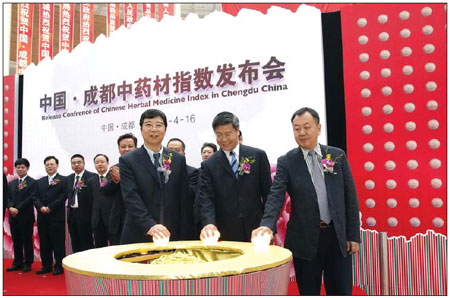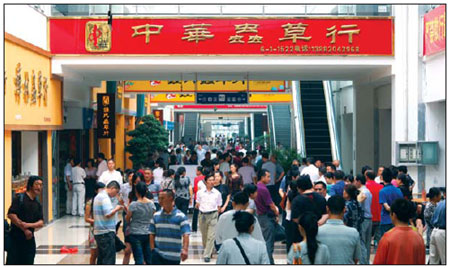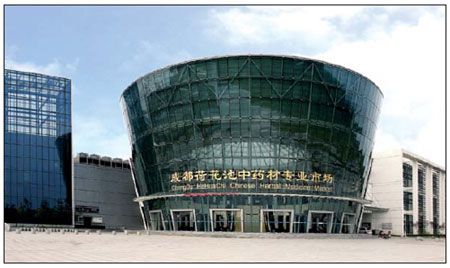Chengdu Special: Index to boost cultivation and trade in TCM herbs
|
Ji Zhen (left), Chengdu Party standing committee member, Li Rongcan (center), assistant to the Minister of Commerce, and Li Jiaguo, a senior government official of Sichuan, inaugurate the Chengdu Index. |
|
Buyers travel from around the country and world for traditional herbs sold at Hehuachi market. |
|
Chengdu Hehuachi Chinese Herbal Medicine Market. |
Complied in Chengdu, data to help with planting and pricing
A new index of Chinese herbal medicines published in Chengdu, capital of Sichuan province, on April 16 will help both the government and businesses in the field understand trends and promote further development of the industry, said Zhang Jinquan, deputy director of Chengdu Commerce Bureau.
"The index will become a weather vane in the country's herbal medicine market," Zhang said.
Authorized by the Ministry of Commerce, the Chengdu Index carries prices and purchase data on medicines reflecting the overall commerce in traditional Chinese medicines.
The price list, which includes 1,275 kinds of medicines, is published each week, according to Zhang.
WHO acceptance
More people globally now think Chinese herbal medicines have few side effects, while the World Health Organization has accepted it as a method to treat illness and protect health, he noted.
"But prices of Chinese herbal medicines on the international market have been unstable due to the lack of a standardized index," Zhang said.
Traditional medicine businesses also find supply and demand information hard to get, which has long prevented them from benefiting from the booming international market, Zhang said.
"The lack of an indicator has hampered the development of Chinese herbal medicine, so this important indicator can help the government and businesses better know purchasing conditions and price trends in a timely way," Zhang said.
He added that the index will be particularly beneficial knowing what herbs to plant to meet both domestic and international demand.
The index will be published by a market information service system platform authorized by the Ministry of Commerce.
It will also be carried online at cif.mofcom.gov.cn/cif/html/ each week and updated to meet changing conditions.
The Hehuachi Chinese Herbal Medicine Market in the Chengdu International Commerce and Trade Center, reportedly the biggest of its kind in China, will collect up-to-date data.
Publication of the index in Chengdu, capital of Sichuan province, is due to the region's booming production of herbal medicines, according to officials.
Sichuan is the country's biggest province in cultivation of herbs used in traditional medicine and production of more than 5,000 kinds of traditional medicine. Seventy percent of them are traded in Chengdu.
The local Party committee and government authorities are determined to further develop the industry into a pillar of the Chengdu economy.
In 2009, 29,000 hectares of herbs used in medicine were planted, a figure projected to grow to 33,000 hectares by 2017, when a 100,000 tons of herbal medicine is expected to be produced annually.
Chengdu's Hehuachi market is now one of the top three herbal medicine trading centers in China.
Authorities in Jinniu district of Chengdu began plans for the herbal medicine index in 2010.
(China Daily 04/21/2011 page15)











